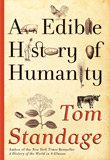
Critics' Opinion:
Readers' rating:
Published May 2009
288 pages
Genre: History, Current Affairs and Religion
Publication Information
The bestselling author of A History of the World in 6 Glasses brilliantly charts how foods have transformed human culture through the ages.
Throughout history, food has acted as a catalyst of social change, political organization, geopolitical competition, industrial development, military conflict, and economic expansion. An Edible History of Humanity is a pithy, entertaining account of how a series of changes—caused, enabled or influenced by food—has helped to shape and transform societies around the world.
The first civilizations were built on barley and wheat in the Near East, millet and rice in Asia, corn and potatoes in the Americas. Why farming created a strictly ordered social hierarchy instead of the egalitarianism of hunter-gatherers is, as Tom Standage reveals, as interesting as the details of the complex cultures that emerged, eventually interconnected by commerce. Trade in exotic spices spawned the age of exploration and colonization of the New World.
Food’s influence over the course of history extends into modern times. In the late eighteenth century Britain’s solution to food shortages was to industrialize and import food rather than grow it. Food helped to determine the outcome of wars: Napoleon’s rise and fall was intimately connected with his ability to feed his vast armies. In the twentieth century, Communist leaders employed food as an ideological weapon, resulting in the death by starvation of millions in the Soviet Union and China. And today the foods we choose in the supermarket connect us to global debates about trade, development, the environment, and the adoption of new technologies.
Drawing from many fields, including genetics, archaeology, anthropology, ethno-botany, and economics—and invoking food as a special form of technology—An Edible History of Humanity is an appetizing and fully satisfying discourse on the sweep of human history.
"Some topics, like the spice trade's encouragement of exploration, are fairly obvious choices, but the concise style and inclusion of little-known details keep the material both entertaining and enlightening." - Library Journal
"An intense briefing on the making of our world from the vantage point of food history." - Kirkus Reviews
This information about An Edible History of Humanity was first featured
in "The BookBrowse Review" - BookBrowse's membership magazine, and in our weekly "Publishing This Week" newsletter. Publication information is for the USA, and (unless stated otherwise) represents the first print edition. The reviews are necessarily limited to those that were available to us ahead of publication. If you are the publisher or author and feel that they do not properly reflect the range of media opinion now available, send us a message with the mainstream reviews that you would like to see added.
Any "Author Information" displayed below reflects the author's biography at the time this particular book was published.
Tom Standage is Deputy Editor at The Economist, overseeing its strategy and output on digital platforms, including the web, apps and social media. He previously served as Business Affairs Editor, Business Editor, Technology Editor and Science Correspondent. Tom is also the author of six history books, including Writing on the Wall: Social Media—The First 2,000 Years, the New York Times bestseller A History of the World in Six Glasses (2005), and The Victorian Internet (1998), a history of the telegraph.
He holds a degree in engineering and computer science from Oxford University, and is the least musical member of a musical family. He is married and lives in London with his wife and children.





The Funeral Cryer by Wenyan Lu
Debut novelist Wenyan Lu brings us this witty yet profound story about one woman's midlife reawakening in contemporary rural China.
Your guide toexceptional books
BookBrowse seeks out and recommends the best in contemporary fiction and nonfiction—books that not only engage and entertain but also deepen our understanding of ourselves and the world around us.